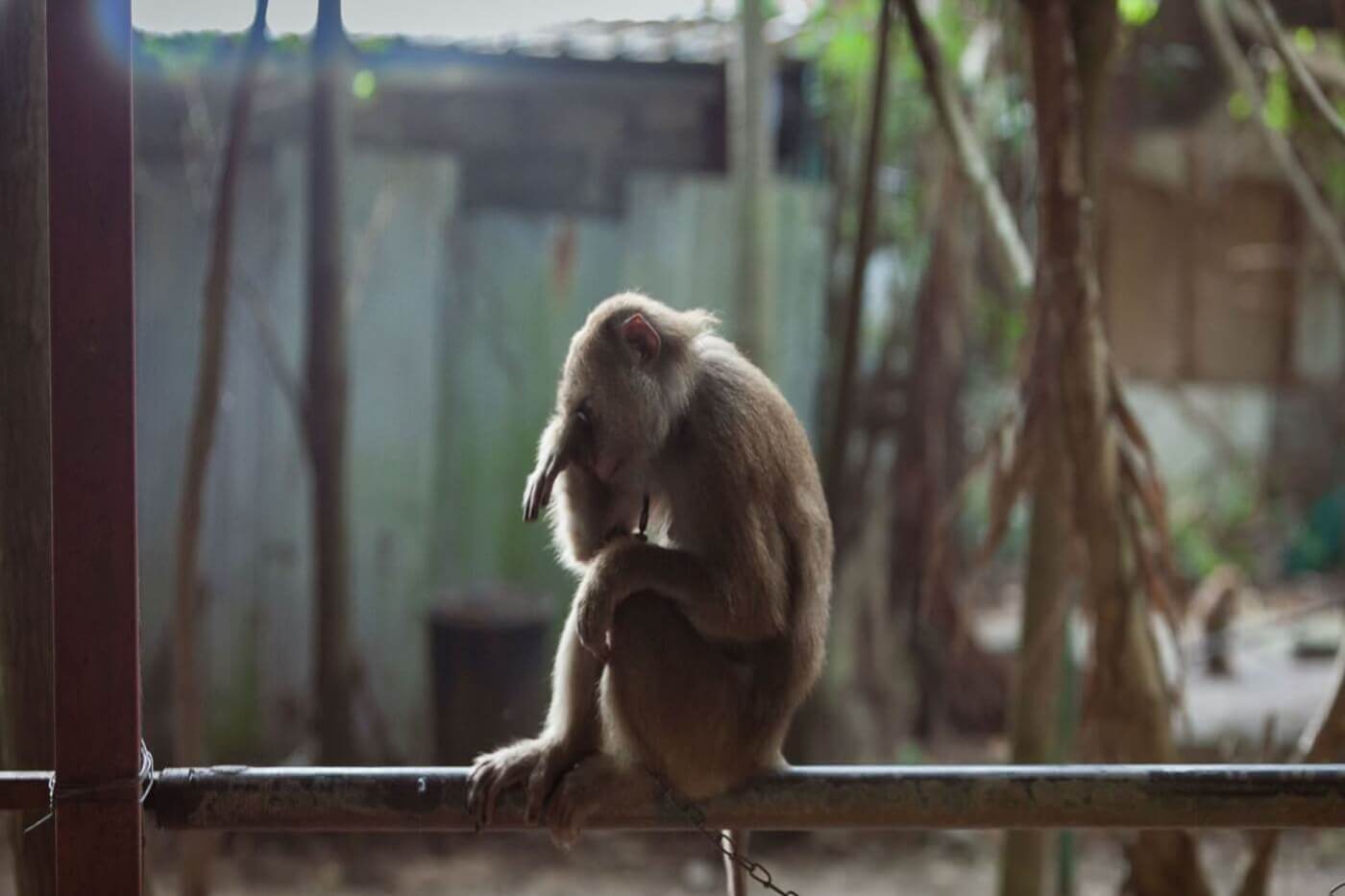PETA Uncovers Heartbreaking Exploitation of Monkeys in the Thai Coconut Industry
PETA Asia investigations have revealed that in the Thai coconut industry, monkeys are kept in chains and forced to climb tall trees and pick coconuts that are then sold and distributed all over the world. These endangered and vulnerable animals are illegally abducted from their families and homes when they’re just babies or bred in captivity, never able to experience freedom—and then they’re whipped and beaten to break their spirit and compel them to obey. These smart and sensitive individuals are kept chained in isolation, often without proper food, water, or shelter from the elements, and endure joyless lives, denied everything that’s important to them.
A Look Back at the Explosive PETA Asia Investigations That Blew the Lid off the Thai Coconut Industry

PETA Asia Discovers Monkeys Exploited on Thai Coconut Farms
In 2019, PETA Asia investigators visited Thai coconut farms for the first time and documented the shocking exploitation that these operations forced monkeys to endure. These curious animals were denied the freedom to socialize with their peers, move freely, or engage in any other natural activities. They could only pace and circle endlessly on the barren, trash-strewn patches of dirt where they were chained.
Investigators tracked the coconuts sold by these farms and found that Chaokoh—one of the most popular Thai coconut milk brands in the world—was sourcing coconuts directly from farms running on forced monkey labor. The Thai government and Chaokoh were both immediately informed in the hope that one of them would intervene when presented with the evidence that monkeys were suffering.
PETA Asia Digs Deeper Into the Coconut Industry as the Thai Government and Chaokoh Ignore the Evidence
In 2020, PETA Asia investigators went back to the same farms they had examined during their first investigation and found that Chaokoh was still using coconuts obtained by monkey labor and that the Thai government was ignoring the cruel practice.
They dug deeper into the industry and discovered “monkey schools,” where infant monkeys who had been kidnapped from their mothers were chained up and forcibly “trained” to pick coconuts. They also learned that some “trainers” made extra money by forcing the monkeys under their control to participate in circus-style shows, entertaining paying customers by riding bicycles, shooting basketballs, and performing other confusing and demeaning tricks.
PETA Asia Disproves Thai Government’s Phony ‘Monkey-Free’ Claims
Between December 2021 and July 2022, PETA Asia returned to Thailand for its most comprehensive investigation into the Thai coconut industry yet. Investigators traveled to over 140 locations throughout all of Thailand’s top coconut-producing regions and found that rampant abuse of monkeys was still going unchecked even though the Thai government had publicly claimed that monkeys were no longer being exploited in Thailand.
PETA Asia investigators captured footage that showed monkeys tethered by the neck and yanked from tree to tree. One farmer claimed that the monkeys were frequently bitten by ants and stung by hornets while climbing and that they sometimes even broke bones from falling out of trees if they were yanked back down too violently.
Investigators interviewed coconut brokers and discovered the names of specific companies linked directly to monkey labor, including Thai Kitchen, Taste of Asia, Blue Dragon, and Aroy-D. The coconut brokers explained to investigators that the overall lack of oversight—and the infrequent, preannounced visits to farms by the Thai government’s certification program—made it easy for farms to lie about using monkey labor without any consequences.
Following the third investigation, the Thai government began handing out phony “monkey-free” assurances to protect its international reputation instead of solving the problem by banning monkey labor. The Thai coconut industry’s abuse of monkeys was so widespread that PETA had no choice but to announce that it was impossible to guarantee that any coconut milk coming from Thailand was “monkey-free.” Thailand’s “monkey-free” certificate program was exposed as meaningless—nothing but a marketing scheme designed to hide the abuse of monkeys.
PETA Persuades a Thailand-Based Coconut Company to Leave Its Home Country
In a historic move, Thailand-based company Chef’s Choice Foods confirmed that it would no longer obtain coconuts from its home country. After speaking with PETA and learning about the depth of corruption in the Thai coconut industry, the company moved its supply chain to a different country in order to ensure fully that no monkeys would be harmed to make its products.
PETA Persuades Company to Become First Monkey-Free Thai Brand
Between 2023 and 2024, PETA Asia conducted a fourth investigation into the Thai coconut industry, which found again that monkey labor persisted without penalty. One key finding in this investigation was the discovery of monkey labor on a farm that sells coconuts to a company called Merit Food Products.
Merit Food Products is a large coconut milk producer in Thailand, and many major brands in the U.S. do business with it, including 365 by Whole Foods Market.
Back in 2022, during PETA Asia’s third investigation, investigators exposed an Merit Food Products coconut milk brand for buying coconuts from a farm using monkey labor. In a 2023 letter to PETA, the farm actually confirmed its use of monkeys and even its relationship with Merit Food Products.
Since then, Thailand’s Department of Agriculture has issued Merit Food Products a “monkey-free” certificate as part of its push to persuade consumers that nothing was amiss in the Thai coconut industry. But during a new 2024 investigation, investigators inspected another farm that was certified “monkey-free” and sold coconuts to Merit Food Products. There they witnessed workers yanking tethered monkeys from tree to tree as they forced them to pick coconuts. There was no attempt to hide the monkeys from investigators, which just goes to show that “monkey-free” assurances from the Thai government can’t be trusted.
But a silver lining appeared when PETA brought its concerns to Merit Food Products. The compassionate company took action to eliminate the offending farms from its supply chain and move its sourcing to other countries, just as Chef’s Choice Foods had done. It also worked hard to ensure that five farms in Thailand would operate without exploiting monkeys. After an additional, private investigation into the five local farms, PETA is delighted to recognize Merit Food Products as the first monkey-free company sourcing from Thailand!
Merit Food Products is leading the way, but PETA won’t stop working until all coconut farms in Thailand are monkey-free.
PETA Teams Up With Mike White for ‘Monkey School’ Exposé
After its fourth investigation into the exploitative Thai coconut industry, PETA published an exposé of the heartbreaking “monkey schools” where infant macaques are forcibly “trained” to pick coconuts.
PETA Asia investigators traveled with veterinarian Dr. Heather Rally to “monkey schools” in Thailand, where workers chained and isolated baby macaques, breaking their spirits so that they could be compelled to pick coconuts for the rest of their lives.
 © StarMaxInc.com
© StarMaxInc.com Shocked by the Thai coconut industry’s shameful practices shown in PETA’s Monkey School Exposé, Emmy Award–winning White Lotus creator Mike White joined forces with PETA and wrote a letter to Thailand’s prime minister, urging her to shut down the “monkey schools” and end forced monkey labor.
Take Action
Urge the Thai government to shut down all “monkey schools” and ban monkey labor immediately. And until the Thai coconut industry is completely monkey-free, PETA urges consumers not to buy Thai coconut milk unless the brand is on our list at PETA.org/ThaiCoconut.